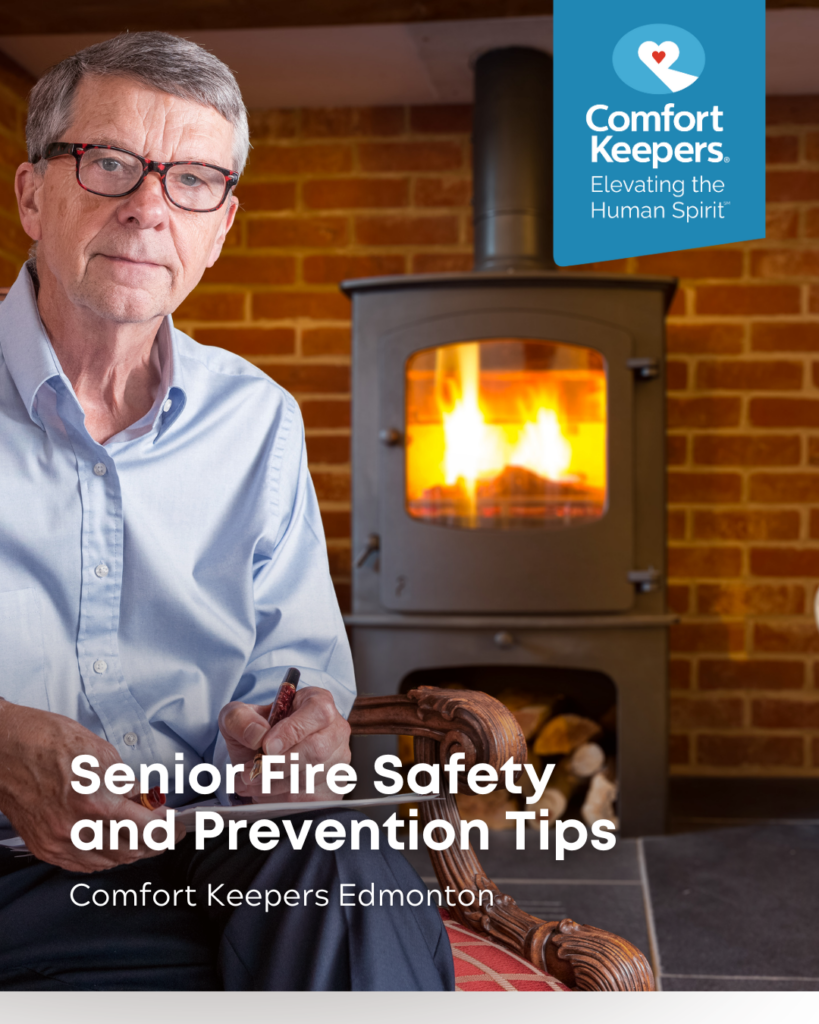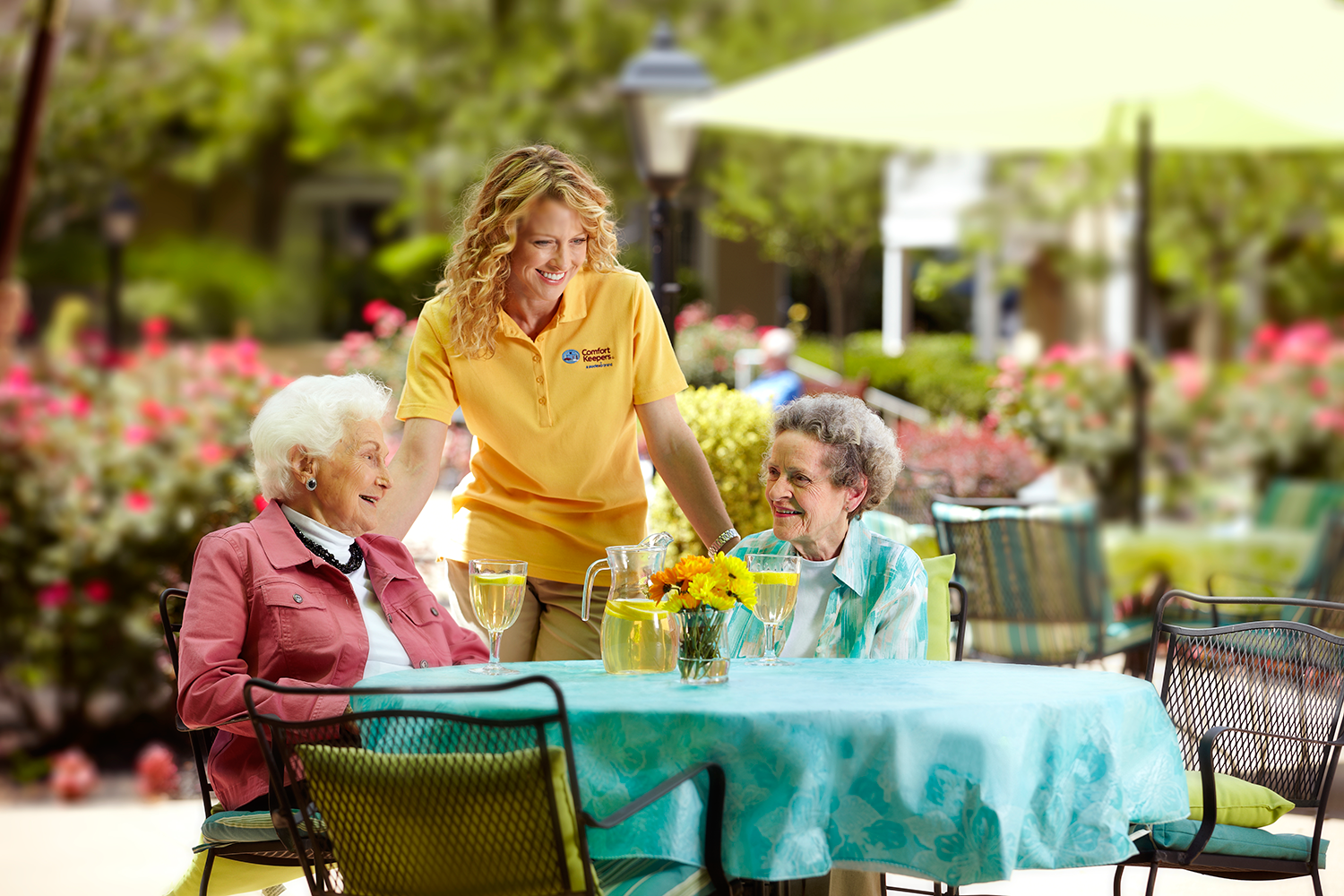Senior Fire Safety and Prevention Tips
Senior Safety | December 16, 2022

What Every Senior in Edmonton, AB, Needs to Know About Fire Safety and Prevention
What do you need to know about senior fire safety? According to the NFPA (National Fire Protection Association), the leading cause of fire deaths in the home for adults 65 years of age and older is smoking. The second leading cause is heating equipment. It’s important to discuss fire safety and prevention tips for seniors.
Senior Fire Safety
Fire is considered one of the most powerful forces known to man. Our early ancestors relied on it for warmth and protection. In modern times, we utilize it (cautiously) in certain ecological management efforts. Fire is powerful, volatile, and demands our utmost respect. There’s no denying its potential for destruction.
Consider, for instance, the thousands of wildfires that occur in the United States each year, often leaving behind nothing but a trail of devastation. House fires also number in the thousands annually. And while fire undoubtedly knows no bounds and can affect anyone, a certain age group tends to fall victim to fire more than any other.
Where There’s Smoke: Senior Fire Safety
Data continually indicates that older adults (those 65 years of age and older) face a greater overall risk of dying in a fire. In fact, according to the U.S. Fire Administration, older adults made up approximately 14 percent of the total U.S. population in 2014, and yet they represented nearly 40 percent of all fire deaths. What’s more, seniors are two and a half times more likely to die in a fire than those in other age groups. And what exactly accounts for these alarming statistics? As it turns out, there are quite a few.
Senior Fire Safety: Risk Factors
As we age, it’s more common for our physical and mental abilities to decline. Naturally, this can have a direct effect on one’s possibility of survival from a fire. For example, the limited mobility (or even range of motion) that a senior experiences can impede his or her ability to escape a house when it’s aflame. But think of the senses we rely on every day (vision, hearing, smell, taste, touch), and how many of them play pivotal roles in alerting us when danger is close. It’s easy to take these for granted when we’re younger, but it can become increasingly difficult to depend on them to work at peak efficiency, once we’re older.
Reaction Time is also a Factor in Senior Fire Safety
Studies indicate that our physical response time can diminish with age, due to certain changes in the corpus callosum as well as other neural deficiencies. Some medications can also hinder a senior’s ability to react quickly. Similarly, seniors can become drowsy or fall asleep altogether from specific medication, which makes them highly vulnerable to smoke inhalation.
The factors above represent why older adults are more likely to be injured or die in a fire – but what causes these fires to occur? Not surprisingly, a majority result from accidents in the kitchen. If cooking food is left unattended, or if there’s a buildup of grease, a fire can form within minutes. It’s also quite common for fires to start because of problems with electrical distribution (overloaded outlets, faulty wiring, etc.), alternative heating sources, unattended candles, and smoking cigarettes in the home.
With so many potential sources of danger in the home, many of which can be seemingly out of sight and out of mind, it’s not unreasonable for a senior to feel like it’s only a matter of time before a fire occurs. Fires aren’t necessarily inevitable, but it also doesn’t take much for them to start and spread. Fortunately, there are several steps older adults can take to not only alert them of when a fire occurs but also reduce the risk of fire formation.
Fire Risk Reduction Tips for Seniors
Tip #1 – Detect Smoke:
If there are currently no smoke detectors in the home, make sure they are installed immediately. There should be a detector on the ceiling, near each sleeping area, and on each level of the home or apartment. Ensure that the detectors are cleaned and that the batteries are changed at least twice a year. If you have difficulty hearing, be sure to test the detectors to ensure that you can hear them.
Tip #2 – Have A Plan:
While being alert is a vital component of fire safety, it doesn’t mean much if you don’t also have an escape plan. Be sure you understand exactly where you can go if there’s a fire, and what alternative route is available through the home, should the primary escape route be compromised. Any escape plan should adhere to your specific needs and capabilities. That means ensuring that any aids you need to maneuver through the home (e.g., eyeglasses, walking cane, or wheelchair) are with you at any given point.
Tip #3 – Cook Safely:
As previously mentioned, the kitchen represents one of the areas of the home where a fire can ignite in the blink of an eye. Never leave cooking food unattended, and be sure to avoid wearing loose clothing when near a heat source. Similarly, you’ll want to ensure that any other flammable materials (paper towels, towels, mail, magazines, etc.) are as far away from the heat as possible. Finally, every kitchen should have a class ABC fire extinguisher installed or in the immediate vicinity.
Tip #4 – Smoke Responsibly:
Smoking in the home is extraordinarily dangerous. Even if you think that a cigarette is extinguished, there’s a chance that hot ashes can find their way onto furniture or other flammable materials in the room. For similar reasons, one should never smoke while in bed. Ashtrays should be emptied either into the toilet, sink, or an empty metal container. If emptied into a waste bin, the ashes could ignite the surrounding trash.
Tip #5 – Check Wiring:
We often hear about faulty wiring being responsible for house fires, but you may find yourself asking what indicates that there’s a problem with wiring. If you notice that lights are dimming as you use an appliance, or if you have to unplug one appliance for another one to work, bad wiring may be the culprit. Blown fuses also indicate that a problem exists. Be sure that you schedule an electrician to provide a thorough inspection.
Comfort Keepers® Edmonton is Proud to Offer a Wide Range of Home Senior Care Services
Our trained caregivers will ensure your loved one is comfortable, independent and safe in their home. On top of that, we will also aim to enhance their overall health, quality of life and general happiness.
Top-Notch Home Healthcare for Seniors in Edmonton, Alberta
Comfort Keepers of Edmonton offers a wider range of senior care services. We offer retirement care, respite care, senior care, companionship care, end-of-life care, post-surgery care, palliative care, personal care, and senior living transition services. If you are concerned about the health and well-being of your aging loved ones we can help with 24-hour care and more!
Helping Seniors Age-in-Place with Companionship Care and Interactive Caregiving™
Empathetic care starts in the heart and allows us to meet our client’s needs. Our trained caregivers are selected with one specific quality in mind, empathy. We strive to stimulate our clients emotionally, mentally and socially, thus enhancing their overall quality of life.
Our Interactive Caregiving™ provides a system of care that addresses companionship, safety, nutrition, mind, body, and activities of daily living (ADLs). The system increases seniors’ sense of well-being, independence and companionship by focusing on Senior Mind, Senior Body, Senior Nutrition, and Senior Safety.
Affordable and Client-Directed Homecare is Available for Qualifying Albertans
Comfort Keepers® Edmonton is an Approved Service Provider for the Client Directed Homecare Invoicing (CDHCI) Program Offered by Alberta Health Services.
What is the Client Directed Home Care Invoicing Program (CDHCI)?
CDHCI is a great program provided by Alberta Health Services (AHS), allowing clients to choose an approved agency like, Comfort Keepers Edmonton for Personal Care, Respite Care and Homemaking needs. The chosen agency can then bill AHS directly for services rendered for approved hours through Alberta Blue Cross. Read more about the program HERE.
Accredited Home Care Edmonton
Comfort Keepers® Edmonton was awarded the “Accredited with Exemplary Standing” seal by Accreditation Canada. This honour demonstrates Comfort Keepers’ commitment to offering safe, high-quality home care to its senior clients in Edmonton, AB.
To learn more about senior in-home care in Edmonton, contact the Comfort Keepers® office. Our service territory includes Edmonton, Devon, Sherwood Park, Stony Plain and surrounding areas, contact the Comfort Keepers Edmonton office at 780-465-4665.
References:
- Love to Know. “Elderly Fire Safety” by Terry Hurley. Web. 2017.
- U.S. Fire Administration. “Fire Safety Outreach Materials for Older Adults.” Web. 2017.
- Real Insurance. “The Most Common Causes of House Fires.” Web. 2013.
Individualized Home Care Options
Long-Term Home Care, 24 Hour Home Care & Short Term Care Options Customized for You







